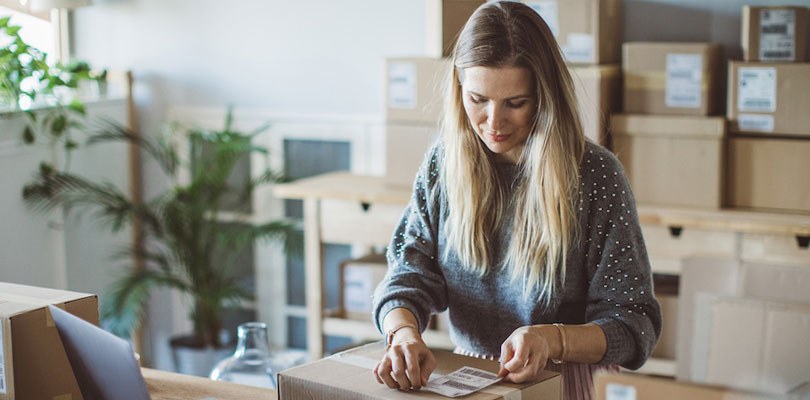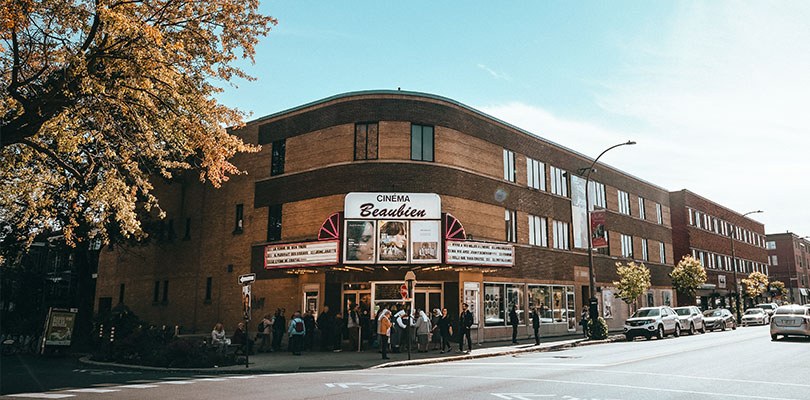E-commerce: Four tips for better packaging
Topic: Sustainable development Logistics
Step: Growing
Retail, Electronic commerce 30 November 2021

A package arrives in bad shape … goods that get damaged during transport … These types of situations are all too real these days. To build customer loyalty, retailers need to pay attention to how their parcels are packaged before shipping, and also to their impact on the environment. Here are our tips for making the right choices.
1. Optimize packaging and shipping fees
The primary role of packaging is to protect your products so that your client receives them in good condition. In light of this, it is crucial to choose the right packaging for the product. Here is Souad Laidi, Director, Commercialization of innovations, e-commerce logistics at PME MTL Centre-Ouest’s recommendation: “It is important to use the smallest possible container, because this impacts transportation fees and is better for the environment.”
Analyze your needs properly to select the shipping solution that is best suited to the products that you sell: padded or bubble envelopes, polyethylene bags (for lighter items, such as clothing), cardboard boxes, insulated boxes (for food items) – there are many different options. Ms. Laidi continues: “It is essential to have an assortment of formats based on the number of items being shipped. This allows employees to use the most appropriate format and ship orders quickly. It is also important to provide sufficient space for stocking the packaging inventory to avoid cluttering up the packing station in the warehouse and hindering the shipping process.”
Choosing the right format also allows shippers to avoid over-packing to ensure that products don’t move around. There are many types of filler materials: Kraft paper, crinkled paper shreds, plastic bubble wrap, styrofoam packing peanuts, etc. The less you have to use, the more you reduce your costs.
2. Wrap up your clients at the same time
Boxes with your company colours, tape that displays your logo, a handwritten note thanking the client or offering a discount on the next order, free samples … there are a number of ways to personalize your parcels. It’s that little bit extra that can make a big difference when it comes to customer loyalty.
“Packaging enhances the overall purchasing experience. It should be as carefully thought out as the online purchasing process. Above all, it is important to ensure that receiving a package does not spoil an experience that was pleasant up to that point,” Souad Laidi points out.
It is also important to remember that packaging reflects the company’s brand image. Purchasers will enjoy unboxing their packages more if the packaging is well designed. More and more consumers now do so online. In fact, unboxing videos can be found everywhere on YouTube. Some are seen by hundreds of thousands of potential purchasers. Ms. Laidi confirms: “In the case of highly specialized products, consumers love to film the unboxing of their packages. In doing so, they can become wonderful brand ambassadors.”
3. Prioritize eco-responsible packaging
The incredible growth of e-commerce produces a massive volume of waste. With this, consumers are becoming increasingly conscious of the efforts that retailers take to reduce their environmental impact. Zoé Nys, Consultant – Circular Economy and Sustainable Development at PME MTL Est-de-l’Île, offers the following advice: “As much as possible, it is best to use recycled materials such as cardboard and plastic. It is also possible to obtain reconditioned cardboard boxes.”
Recyclable packaging should be prioritized as well. “For example, if the company uses padded envelopes, it is better to ensure that the materials can be easily separated so that they can be recycled more efficiently. Be aware that not all types of plastics are recyclable. Consider informing your clients about the best ways to sort their recyclable materials”, Zoé Nys explains.
Promoting the reuse of packaging is another beneficial solution that helps to reduce waste. Whether it involves sending the packaging back to the shipper or using it for another purpose, a study conducted in France shows that one-third of online purchasers reuse their packaging. Ms. Nys adds: “Canada Post also offers some helpful tips in this area.”
According to Ms. Laidi: “We are seeing a number of trends appearing in the reusable packaging market, especially in Europe. Suppliers like RePack, Hipli and LimeLoop offer solutions that companies here don’t use much, most notably in the fashion industry. We are keeping a close eye on these trends.”
4. Make friends with your suppliers
If your supplier doesn’t have the packaging solution that is best suited to your products, speak to them about it! “By communicating their needs, retailers can inspire suppliers to innovate and create new products”, Souad Laidi reiterates. Doing business with a local supplier makes things easier, in addition to protecting the company from supply chain uncertainty.
In conclusion, packaging is more than just packaging. It is also a powerful marketing tool that reflects the company’s values. As such, it deserves your attention.
_
Related articles
Les comparateurs de tarifs: se simplifier la vie… et la livraison (Only in French)
Articles
Des entrepreneurs qui font la différence
PME MTL vous propose des guides pratiques pour vous accompagner à chaque étape de votre parcours. Gagnez du temps avec des ressources conçues pour répondre à vos besoins spécifiques.




